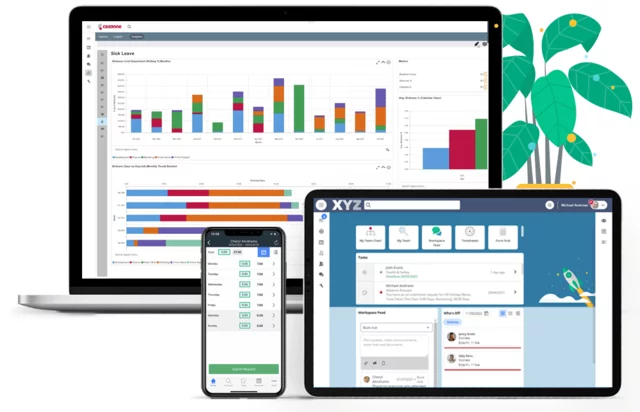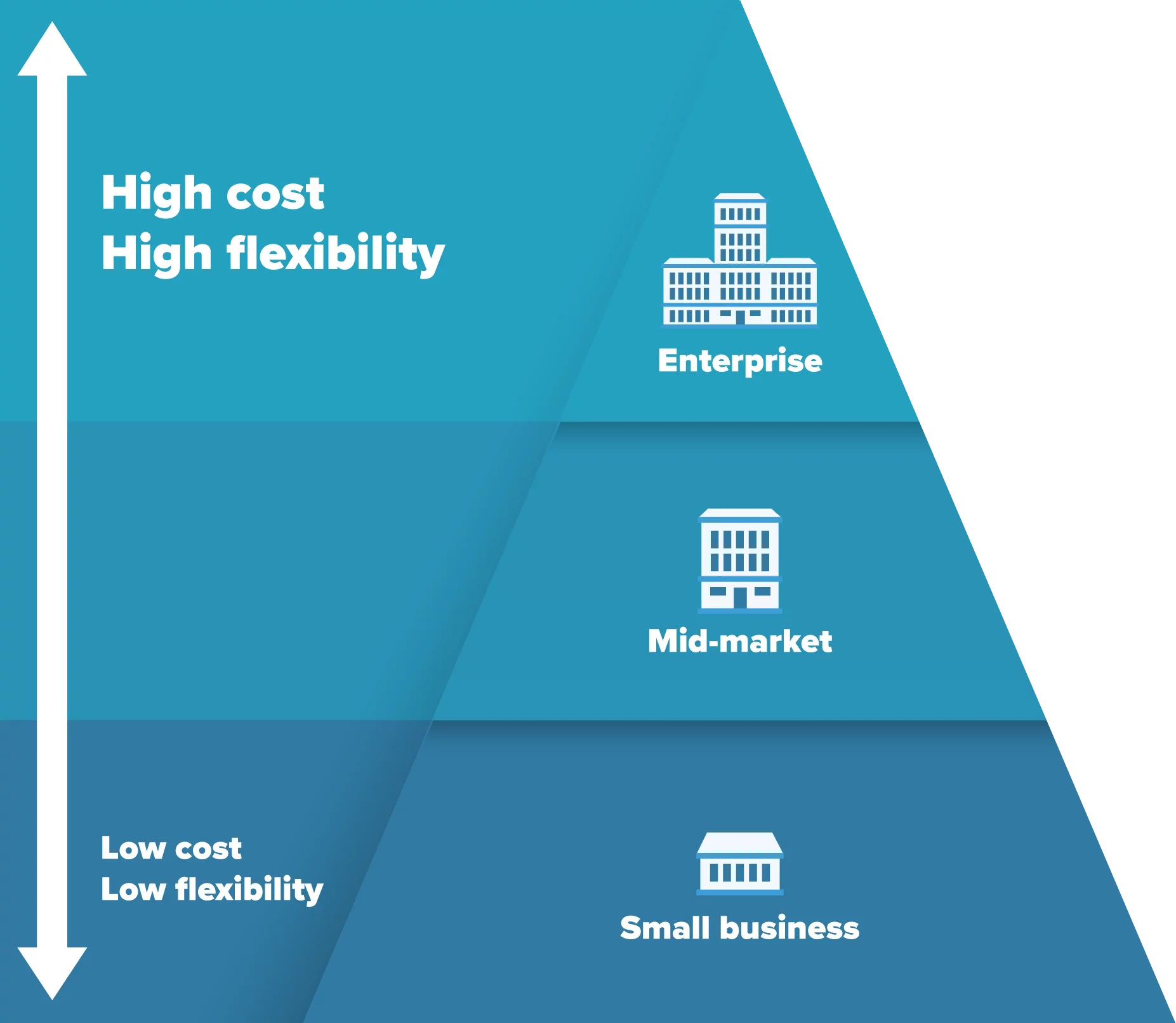HRIS or human resources information system is used by businesses to manage and support their employees and improve the running of the organisation. HRIS software brings together and organises employee-related data, streamlines human resources administration, enables compliance and ensures HR professionals and business leaders can make better-informed decisions faster.
Modern HRIS software also enables employee engagement by improving communication, supporting talent management and performance management and providing HR tools that help staff and managers work better together.
Learn about HRIS self-service

What are the benefits of HRIS software?
The key benefits of an HRIS are significantly reduced adminstrative overheads, improved data accuracy and better insight into employee data. Organisations may also benefit from easier legislative compliance, more effective resource planning, better employee engagement and more cost-effective recruitment and career planning.
All-in-one HRIS systems that cover the entire employee lifecycle, from recruitment and onboarding through essential HR administration to employee engagement and career and succession planning, provide additional benefits. These include lower costs, easier administration, simpler processes and more insightful reporting.
Top benefits of an HRIS
- Significantly reduced administrative overheads (more time for your and your team)
- Smoother, more effective HR processes that everyone will appreciate
- Accurate, accessible and actionable management information for faster, better decisions
- Better engagement across your whole workforce, including job candidates
- Improved employee data security, integrity and compliance, so you can sleep better at nights

It has revolutionised the business’s entire HR operation
Vision DirectΜάιος 2022
When do you need an HRIS?
It’s easy for over-stretched HR professionals to struggle on with paper files, excel spreadsheets or out-of-date HR solutions even when they know there has to be a better way.
Here are some of the signs that you need a new human resources information system:
- You are spending more time collating data for reports than reading them
- You have no idea of the current employee headcount, absence levels or vacancies
- Sensitive employee data is being shared via spreadsheets, email or paper, putting you at risk of breaching GDPR regulations
- Important HR tasks or key initiatives, such as performance management, are regularly overlooked
- Line managers are complaining they have no visibility over team absences, performance or career aspirations
- Employees are inundating you with requests that could be answered through an online HRIS, such as how much holiday they are due, what the working from home policy is, where to find an old payslip, or how they update their bank details
- Posting a job ad online, or reviewing and responding to applications, takes more than just a few minutes
- New joiners aren’t being smoothly onboarded into your organisation, check-ins aren’t taking place, and probation reviews are late or missed altogether
- Talent management is reactive rather than proactive
What will Cezanne HR's HRIS system do for you?
Cezanne HR simplifies and streamlines every aspect of human resources management. It puts you in control, engages your staff and helps everyone work more productively, wherever they are.
Hear from customers
Discover how leading FinTech company Open GI cut HR admin overheads by 80% with a modern HRIS.

Which is the best HRIS system?
Superficially at least, many of the HRIS available today appear to offer the same features. However, not all systems will fit your business. Here are three reasons why:
1. It's not a fit for your company size
HRIS are built to fit different company sizes. While there is some overlap, most suppliers primarily focus on just one market:
Large enterprise HRIS systems, such as Workday and Oracle, are often part of a wider ERP solution and are aimed at organisations with tens of thousands of employees. They often require many months and considerable time and money to implement.
Mid-market HRIS, like Cezanne HR, are specialist HRIS targeted at the needs of mid-sized organisations. Thanks to modern cloud technologies, they often offer a similar depth and breadth of HR functionality as enterprise HRIS solutions but are quicker to implement, easier to configure and significantly less expensive.
Small business solutions (typically for 5 – 100 employees) reflect the simpler requirements of these organisations. They cover the key HR functions but don’t have the same sophistication or flexibility as the mid-market solutions.

2. It doesn't fit your company sector
Different sectors have different requirements. For example, a public sector human resources management system generally needs to support pay spines and grades while manufacturing or retail organisations may need a human resources information system that manages multiple shift patterns and financial services organisations have specific compliance requirements.
3. It can't cope with international requirements
Most HR information systems are initially developed with just a single country in mind. They may have been translated, but might not adapt to the different compliance requirements or ways of working in different countries. If you have offices in more than one location, it’s important to check that the human resources information system is global from the start.
What are the most popular HRIS modules?
HRIS solutions used to be split into two main areas of specialisation: core HR administrative and legislative support, and employee development, engagement and retention. The latter may be referred to as HRMS, HCM, Human Capital Management or Talent Management software. Increasingly, modern HRIS suites combine elements of both.
Before starting your selection process, it is essential to map out the HR processes you need to support today and the ones that may become more important in the future.
For example, while effectively managing fast growth or long-term career planning may not be the highest priority right now, choosing an HRIS that gives you the option to add integrated recruitment, onboarding or career and succession planning functionality could be something you’d really benefit from in the future.
Core HR administrative support may include:
- Personnel administration
- Holiday and Absence Management
- Rostering and Shift Patterns
- Time and Expense Management
- Payroll
Human Capital Management solutions usually cover:
- Recruitment
- Onboarding
- Performance Management
- Training and Development
- Career and Succession Planning
- Pulse Surveys
- Employee Engagement
Let’s transform HR together
Cezanne HR’s HRIS is trusted by thousands of HR professionals to help them better manage, support, engage and connect their people. Get in touch today to learn more.

More to explore

HRIS and automation
Keeping on top of all HR tasks can be challenging and exhausting. This guide takes you through the top processes you can automate using an HRIS.
Read now

HRIS selection check list
The questions to ask today, so you can be sure your system is fit for tomorrow. This easy-to-use template makes sure you don’t miss any essential questions.
Read more

Lesson learnt
Mark Martin – an HR Director with over 25 years’ experience – shares his experience of implementing HR systems at major international companies.